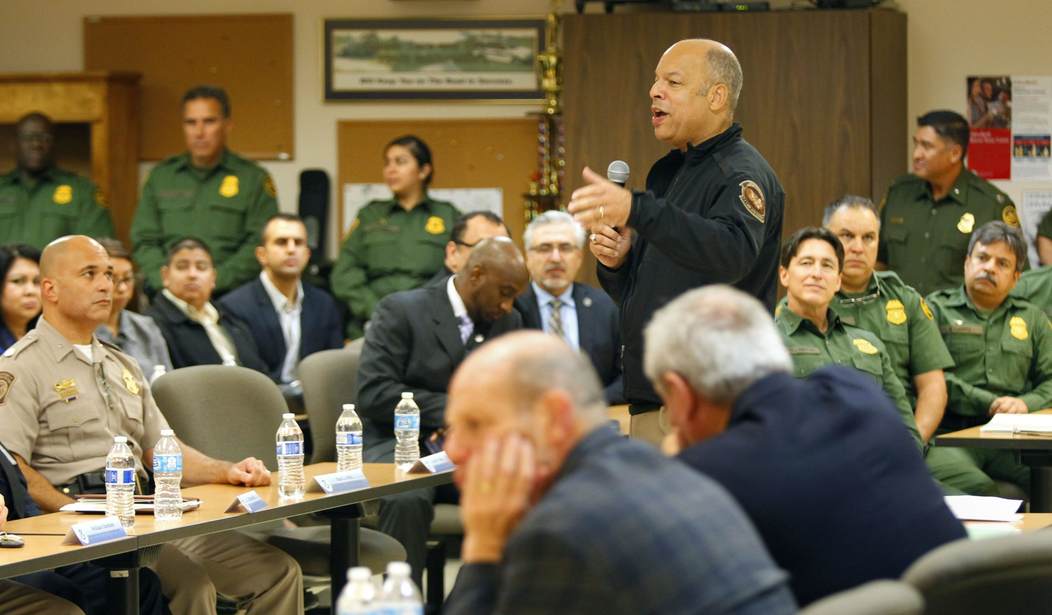WASHINGTON — Homeland Security Secretary Jeh Johnson said President-elect Donald Trump’s administration would not be able to deport up to 3 million illegal immigrants who have criminal records without additional funding from Congress.
President-elect Donald Trump recently explained his plans for immigration law enforcement during an interview on 60 Minutes. While migrants who enter the U.S. illegally or overstay their visa have violated existing U.S. immigration law, Trump said his administration will be focused on illegal immigrants who have committed separate crimes inside the United States.
“What we are going to do is get the people that are criminal and have criminal records, gang members, drug dealers, where a lot of these people, probably 2 million, it could be even 3 million, we are getting them out of our country or we are going to incarcerate,” Trump said. “But we’re getting them out of our country, they’re here illegally.”
Johnson said that is a massive undertaking with a population equivalent to that of Chicago.
“Anything you do of a magnitude you’ve got to get funding from Congress. You’ve got to get Congress to along,” Johnson said at a Bloomberg Government discussion on “New Directions for U.S. Infrastructure: Understanding Emerging Needs and Priorities.”
In April, family members victims of crimes committed by illegal immigrants who were not deported by ICE testified on Capitol Hill and called for justice.
ICE has pointed out that the court system handles most of the cases involving illegal immigrants with criminal records. ICE also said its operations are limited by congressional funding and immigration detention centers have a certain amount of beds.
During a congressional hearing in April, ICE Director Sarah Saldaña confirmed statistics presented by Rep. Jim Jordan (R-Ohio) including that 86,000 illegal aliens with criminal records released into the public by ICE. The majority of those convictions were for drunk driving, yet also included some assault, sex offenses, kidnapping and homicide.
According to Saldaña, ICE had 2,000 beds open for illegal immigrants who commit crimes. She said that number could increase to 3,600 or more beds “tomorrow” as migrants are released or deported.
“Illegal entrant committed a violent crime and they are in your custody, you have the capability, the facilities to hold more and you’re exercising your judgment to release them, and some of those people you released did violent crimes and actually took the lives of American citizens,” Jordan said.
“Today we have about 2,000 beds available based on what this Congress authorized us to do,” Saldaña said.
“I think we’re saying ‘let’s use them,’” Jordan responded.
House Speaker Paul Ryan (R-Wis.) recently said Americans could “put their minds at ease” that there would not be a deportation force under a Trump administration.
“We are not planning on erecting a deportation force. Donald Trump is not planning on that,” Ryan said.
Johnson explained that ICE is considered a deportation force.
“When we talk about a deportation force, we actually already have a deportation force, it’s called ERO, enforcement and remove operations, which is part of ICE, and when we talk about deporting the criminals that’s actually our current policy — our current priorities are public safety and border security, apprehending those that are convicted criminals and removing those who are apprehended at the border for purposes of border security and we have focused increasingly so on public safety and border security since the priorities I issued in November of 2014,” Johnson said.
“I’ve said to our enforcement and removal workforce, ‘focus more on the criminals, focus more on threats to public safety’ and they have actually responded. So we have seen fewer deportations, but a higher percentage of those removed from the interior are convicted criminals and that’s good for public safety,” he added.
Johnson said DHS has changed the pay scale for Border Patrol and hopes the Trump administration follows suit.
“And because I’ve asked our removal force to focus more on threats to public safety and function more like a law enforcement force, we are also changing their pay scale so it aligns more closely with the law enforcement pay scale – and that’s something I hope the next administration will continue to move in the direction toward,” he said.
Not all illegal immigrants apprehended by U.S. Border Patrol agents at the Mexico border are sent back to their home countries. If minors are caught at the border, federal immigration authorities transfer them to the Office of Refugee Resettlement (ORR), an agency within the Department of Health and Human Services (HHS), which pays to house, feed and care for the children. Later, the ORR places them with a relative or “sponsor” living within the United States and the agency does not check the immigration status of the relative. The Associated Press has reported that the government places most of the migrant children with adults living in the U.S. illegally.
According to the official HHS website, “Federal law requires that ORR feed, shelter, and provide medical care for unaccompanied children until it is able to release them to safe settings with sponsors (usually family members), while they await immigration proceedings. These sponsors live in many states.”
In an interview with PJM, John Walsh, creator of America’s Most Wanted, said the U.S.-Mexico border is “as porous as the ocean” and argued that illegal immigrants who commit crimes in the U.S. should be kept in jail and not sent back over the border.
Walsh argued that deportation gives criminal aliens a chance to come back to the U.S. and commit more crimes.









Join the conversation as a VIP Member